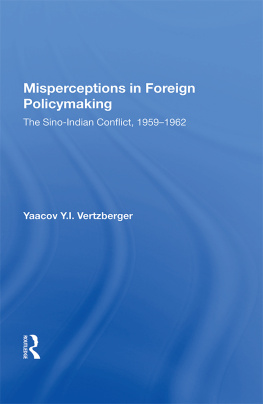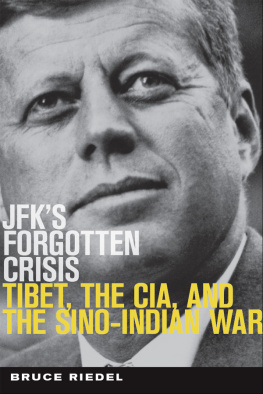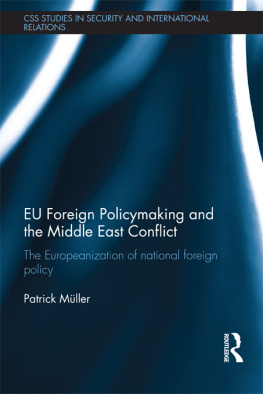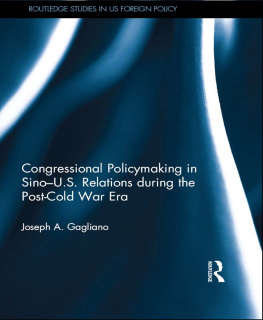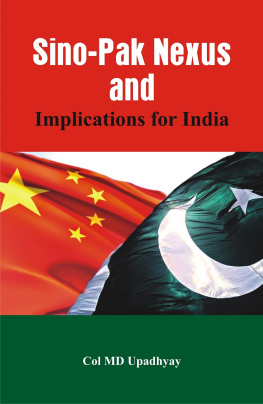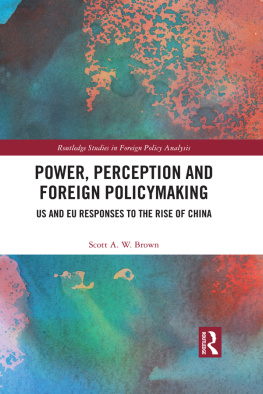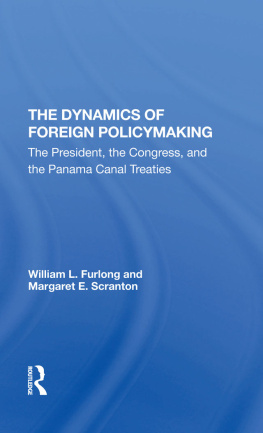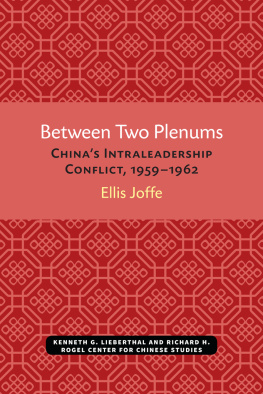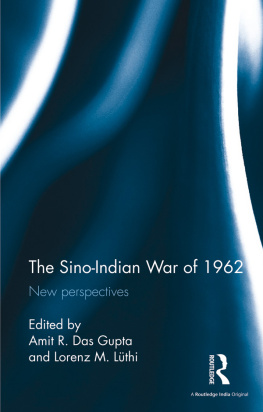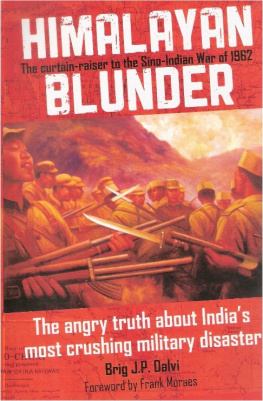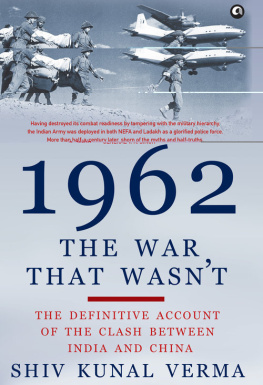About the Book and Author
Misperceptions in Foreign Policymaking: The Sino-Indian Conflict, 19591962
Yaacov Y.I. Vertzberger
This book examines the process by which government leaders perceive events and use information in making foreign policy decisions. In his case study of the Sino-Indian conflict, the author explores the attitudes that shaped Indias policy toward China and traces the network of misunderstandings that led to a war unwanted by both sides. Taking into account technical, organizational, cultural, group-dynamic, and key personality variables, Dr. Vertzberger discusses the Sino-Indian conflict within a global and regional systems perspective and describes what was at stake in the conflict from the point of view of each country involved. Subsequent chapters analyze Nehrus view of Indias role, the influence of national public opinion in shaping Nehrus attitudes, the perceived relationships between Sino-Indian interactions and Indias relations with its neighbors, and Indias evaluation of the balance of power between itself and China. One section of the book focuses on Indias intelligence community and the mishandling of information that led to a failure of signaling efforts on both sides. Cultural differences between China and India, Nehrus personality and style of leadership, and the role of major organizations such as the army, various ministries, and Parliament are also assessed in terms of their impact on the conflict.
Dr. Vertzberger is lecturer in international relations at the Hebrew University in Jerusalem.
Published in cooperation with The Harry S. Truman Research Institute for the Advancement of Peace, The Hebrew University of Jerusalem
For my parents Ester and Tuvia Vertzberger
First published 1984 by Westview Press
Published 2018 by Routledge
52 Vanderbilt Avenue, New York, NY 10017
2 Park Square, Milton Park, Abingdon, Oxon OX14 4RN
Routledge is an imprint of the Taylor & Francis Group, an informa business
Copyright 1984 by Taylor & Francis
All rights reserved. No part of this book may be reprinted or reproduced or utilised in any form or by any electronic, mechanical, or other means, now known or hereafter invented, including photocopying and recording, or in any information storage or retrieval system, without permission in writing from the publishers.
Notice:
Product or corporate names may be trademarks or registered trademarks, and are used only for identification and explanation without intent to infringe.
Library of Congress Cataloging in Publication Data
Vertzberger, Yaacov.
Misperceptions in foreign policymaking.
(A Westview replica edition)
Bibliography: p.
Index included.
1. Sino-Indian Border Dispute, 19591962. 2. IndiaForeign relations. I. Title.
DS480.85.V43 1984954.0483-10206
ISBN 0-86531-970-7
ISBN 13: 978-0-367-02034-7 (hbk)
I do not expect, and I do not want the House to imagine that something very serious is going to happen on our frontiers. I do not at all expect that to happen. ( Prime Minister in Parliament on Sino-Indian Relations , September 12, 1959)
We were getting out of touch with reality in the modern world and we were living in an artificial atmosphere of our own creation. We have been shocked out of it. (Jawaharlal Nehru, The Hindu , October 26, 1962)
We were like bad chess players who make moves without anticipating the opponents moves, or expecting him to counter our move. (Brigadier J.S. Dalvi, 1969, 125)
It was a game of Russian roulette but the highest authorities of India seemed to feel that the one shot in the cylinder was a blank. Unfortunately for them and for the country it was not so. The cylinder was fully loaded. (General J.N. Choudhuri, quoted in Maxwell, 1972, 177)
A book is a brainchild of its author but no man is an island, a fact reflected throughout the entire process from which this study emerged in its final form. When I first arrived as an undergraduate student at the Hebrew University in Jerusalem, I had the opportunity to study under Professor Ellis Joffe. It was he who introduced me to the intricacies of Chinese politics, both domestic and foreign. This he did with much skill, knowledge, and, most of all, elegance, and in a way that imprinted upon me a long-range interest in the complexities of Asian politics in general and Chinese politics in particular. In response to his constant encouragement, I eventually took up research in this field. Ultimately, he became one of my advisers for the dissertation that provided the groundwork for this book. Professor Joffes advice, guidance, and intimate knowledge of the Chinese arena were indispensable to its writing. Critical, patient, and firm, he steered me around pitfalls and away from errors. Subsequently, he encouraged me to rewrite the dissertation in book form. For his ongoing friendship and guidance I shall always be indebted to him.
The other main influence on my intellectual development was Professor Michael Brecher, of McGill University, who pointed me toward the theory of international relations, virgin land for me until then, and demonstrated its richness and utility and the excitement of applying it to a better understanding of international politics. His enthusiasm was so inspiring that I have carried it with me ever since. As a noted scholar, also, of South Asian and in particular Indian affairs, he suggested that I take up an Indian case study, in which his advice and first-hand knowledge could be most usefl. During the period in which he served as the other adviser for my dissertation, which combined my interest in theory, in China, and in India, he allowed me generous use of his private library and archives as well as free access to his time, knowledge, and wise advice. Later, he was kind enough to read an earlier draft of this study and to make important comments. His involvement with my work in general and with this project in particular I value most highly.
Professor Alexander George of Stanford University made it possible for me to stay at Stanford during the year I wrote the draft of this book. Professor George is an outstanding and versatile scholar, and his penetrating advice and support for my project made my year at Stanford most fruitful, stimulating, and memorable. For all his assistance, and for his friendship, I am most grateful.
Although my mention is necessarily brief, I would also like to thank the following people: Dr. Daniel Feferman, who was most helpful in advising me on matters relating to the application of statistical methods; Mr. Rafi Lipkin, who did the computer programming; Mr. Yoel Schleicher, an excellent research assistant, who helped in coding and other matters with his usual reliable dedication, patience, and sound judgment; and my friends Mrs. and Mr. Miriam and Maurice White, who provided me with a home away from home in Palo Alto during the year spent at Stanford University and thereby contributed more than they know to this study. The book could never have been started in the first place without the generous funding and support of the Kadoorie Family Fund for Chinese Studies (a project of the Fund for Higher Education), The Truman Institute of the Hebrew University, and its academic director, Professor Zvi Schiffrin.

